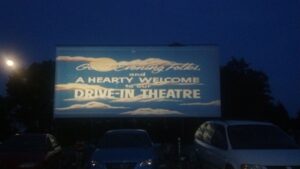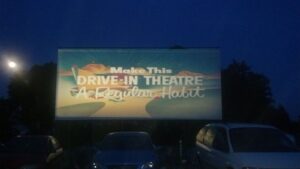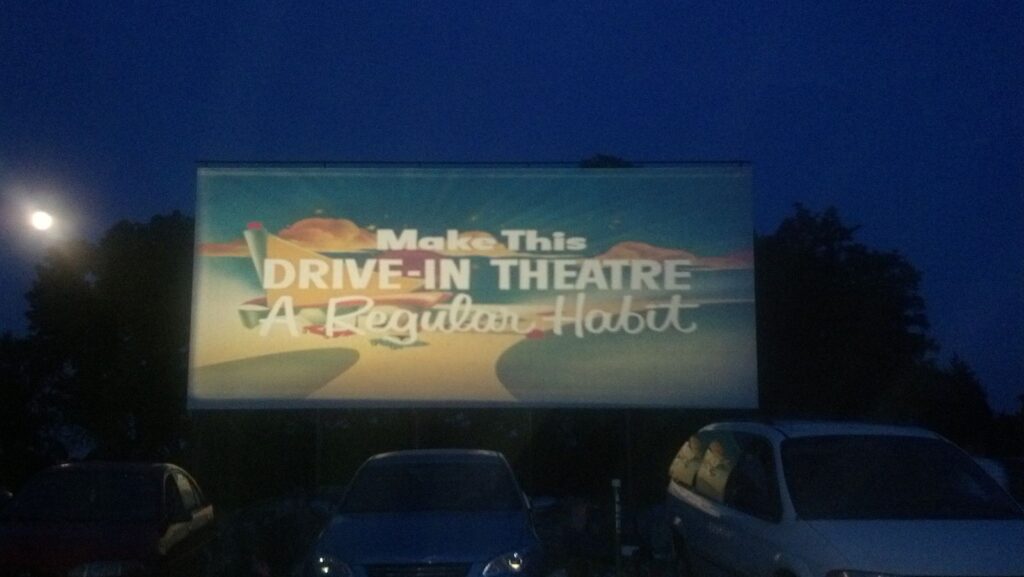P
With the Covid-19 induced closure of movie theaters in the spring of 2020, moviegoers were redirected to watching the latest cinematic offerings on various other viewing platforms. What was the regular moviegoer, who was accustomed to the big-screen experience only a theater could provide, to do? It didn’t take long for both enterprising movie fans and entrepreneurs alike to come up with a solution.
That large screen experience was still waiting for them at their local outdoor theater. The movie industry had categorized movie theaters as either indoor (aka hardtops) or outdoor (aka drive-ins) for decades, but the decline of the drive-ins from their peak in 1958 (over 4800 venues) to just 305 in 2019 meant that the “ozoners” were few and far between by the time of the pandemic. Except for the most dedicated drive-in fans, who were a tiny minority among cinema audiences in the 21st century, attending a drive-in was a virtually forgotten practice. That all changed in 2020.
The remaining drive-ins, which had survived the steady, decades-long decline since the late 1960s, were suddenly in demand for movie fans determined to have that theatrical participation. With so few ozoners left, exhibitors and entrepreneurs resorted to improvising. “Pop-up” outdoor theaters, which had been an alternative for years in select circumstances, mostly in parks and on the sides of buildings, and often one-night-only or strictly limited showings, became a temporary reality.
Suddenly these pop-ups were all the rage, with even more creative utility on display; building rooftops, parking garages, and outdoor settings like sports stadium and shopping mall parking lots all became a thriving substitute for the still shuttered hardtops. Although this practical ingenuity has kept the beleaguered moviegoing experience alive, will the nascent re-opening of indoor theaters combined with the hoped-for retreat of the pandemic interfere with the surprising viability of the drive-ins? Moreover, will indoor and outdoor theaters co-exist as before, or will the drive-ins go back to the “irreversible decline” (as noted in Cinema ’62: The Greatest Year at the Movies) that was unexpectedly and unpredictably halted in 2020? Their fate remains to be seen.
Meanwhile, for an entertaining look at the flourishing drive-in culture of 1962 (still near its ’58 peak), read all about it in Cinema ’62 (Appendix A). Here are some of the fun facts from that year:
Children under twelve were admitted free (after all, they couldn’t drive themselves); theater owners made up for that lost revenue with huge concession stands that offered hot dogs, “pizza pies,” french fries and other snacks not found in regular movie houses at the time.
From dusk to midnight—depending on time zone and summer hours, many drive-ins showed double features and selective triple features, pairing the latest studio releases (both “A” and “B” titles) with indies and imports. Many of the co-features were low budget quickies turned out by the studios, albeit in vastly diminished numbers, and independently produced films that picked up some of the studio slack. Carnival of Souls, a black-and-white indie chiller that has since gained a cult following, first found a home in drive-ins in ’62.
See you at the Starlite: Nearly every state had its own locations with variations on the names Starlite/Starlight and Skyview/Skyvue/Skyway, with spaces for 500 cars on average.
If you do feel inspired to visit a drive-in near you, recall a message often displayed at the end of the program from yesteryear: Drive home safe.
Postscript – With the reopening of indoor theaters in the spring of 2021, the drive-ins that were thriving during their closure were suddenly faced with new challenges. Filmmaker April Wright has made a perceptive documentary, BACK TO THE DRIVE-IN, about the plight of the contemporary drive-ins, essentially family owned businesses, and the socioeconomic impact on their future survival (Highly recommended).






